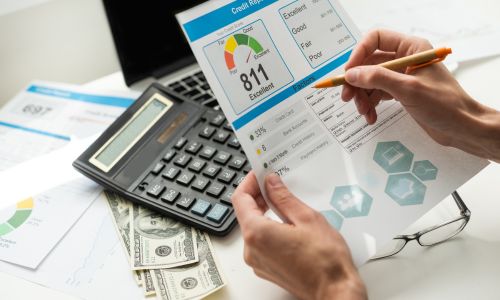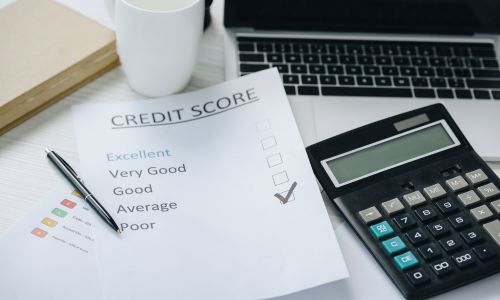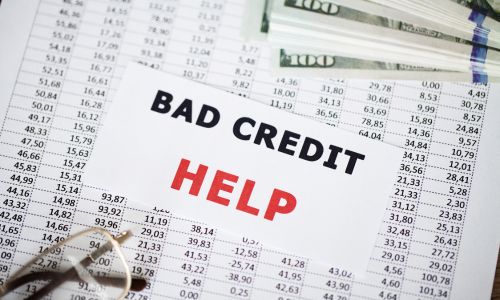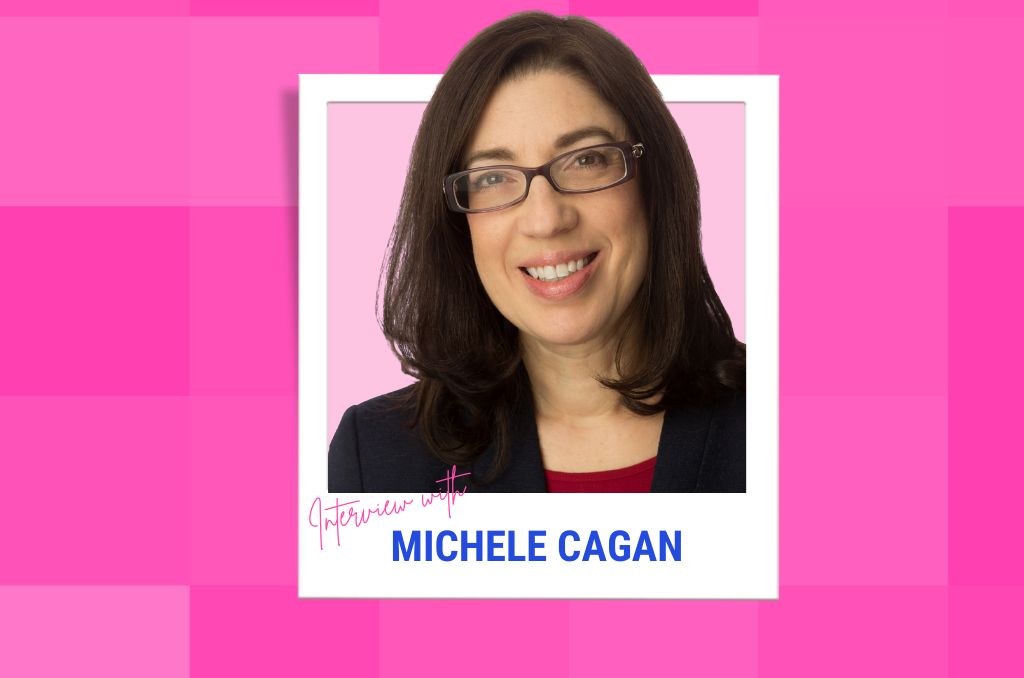Is your credit score absolutely wrecked after you left a bad relationship? Don’t worry. Not all is lost. While what you’re going through can feel overwhelming, it’s not an uncommon experience. Whether your ex damaged your credit score through joint accounts on their way out the door, or you needed to take on a lot of debt to leave an unhealthy relationship, the important thing is that now things are under your control.
We interviewed Michele Cagan, CPA who does a lot of work with single moms to bring you real ways you can make your real finances better. Take a deep breath and read on. You’ve got this.
Start By Taking Inventory Of Your Credit
Before you can fix the problem, you need to know exactly where things stand. Your credit card company may be showing you a three-digit number that makes you unhappy when you log into your account online, but things go so much deeper than your credit score.
First, you’ll want to outline all of your debts. Even though that may feel emotionally difficult. This is an important step because if your ex is still on any of those accounts as an authorized user, removing them could help you stop the damage from getting worse. If it’s a joint account in both your names, closing the account entirely is often the best move.


Knowing how much you owe – whether your ex is on your account or not – also helps you build a realistic plan to dig your way out.
A good step to take is getting a free credit report from AnnualCreditReport.com. The name is a little misleading. You used to be entitled to one free credit report from each credit bureau per year, but ever since the pandemic, you can access your free credit reports once per week.
Don’t go looking for other sites. AnnualCreditReport.com is the only one endorsed by the government, and the only one that’s really and truly totally free with no asterisks.
You’ll want to pull your credit report whether you’re confident in your own assessment of your debts or not. Cagan says a common way partners damage your credit score is through financial infidelity, so there may be line items on there that you’re not aware of even if you’re meticulous with your own finances.
If you find something that’s not actually a debt you took on yourself, Cagan says you can request that the line item be removed. That request may or may not be honored immediately, but it’s worth pursuing even if it ends up being a stressful process.
Freeze Your Credit
Cagan also recommends freezing your credit so nothing new can be taken out – unless it’s intentional on your part. This is important because your ex likely has access to your Social Security number, which makes identity theft and further credit damage within the realm of possibility.
Build Up New, Positive Line Items On Your Credit Report

Fixing your credit isn’t just about stopping or removing bad line items. It’s also about building new, positive line items on your credit report. One of the best ways you can do this is by making on-time payments on your accounts each and every month.
Of course, we’d all like to pay off our debts in full every month. But if you just left a bad relationship, you might have to settle for making minimum payments. This won’t stop interest from accumulating on accounts like credit cards, but making at least the minimum payment can show up as a positive line item on your credit report. And that could help your score moving forward.
Minimize Your Credit Utilization

Did you know that your credit utilization makes up as much as 30% of your credit score? Credit utilization is how much debt is available to you versus how much you’re currently borrowing. For example, let’s say you have one credit card with a $5,000 limit. You’re carrying a balance of $2,500 on it. Your credit utilization would be 50%.
Now, let’s say in addition to that card, you’ve got two more, one with a limit of $1,000 and another with a limit of $4,000. That brings your total available credit to $10,000. You aren’t carrying a balance on either of those cards, so the total debt you’re carrying is still just $2,500. But because you have more credit available to you, your credit utilization in this case would be just 25%.
“Minimizing utilization is very hard to do after a split,” says Cagan, going on to outline that one of the best ways to achieve it is to not cancel a card that’s in your own name after paying it off.
Keeping that account open increases your available credit, and as long as you don’t use it to go into further debt again, having more available credit can lower your credit utilization, which could then in turn increase your credit score.
Manage Interest Charges With Small Payments Throughout The Month

When and how much you pay matters when you’re paying off your debt – especially when it comes to interest charges.
“[It’s better to] make smaller payments throughout the month instead of one big payment on the due date to reduce the average daily balance, which also reduces the new interest charge,” Cagan says.
Use Zero Interest Balance Transfers If You’re In An Okay-Enough Position
Maybe leaving the bad relationship behind damaged your credit score, but not so badly that you don’t qualify for new credit. In that instance, Cagan says opening up a card with a zero-interest balance transfer offer can be a way to pay off your debt faster. That’s because after you complete the balance transfer, you won’t incur any new interest charges for a set number of months.
You have to be careful with this, though. Cagan cautions that you should only make this move if you’re absolutely sure you’ll be able to pay off the debt before the initial zero-interest period expires.
What If My Credit Score Is In The Garbage?

Let’s say the bad relationship left your credit score lower than low. You can’t qualify for traditional credit products, and you’re definitely not getting any zero-interest balance transfer offers.
Even if you’re so far behind that your accounts have been closed, you still owe that company the money you spent before the card got charged off. In this instance, calling up the credit card company and making arrangements for a minimum monthly payment could still help you – as long as you actually make those minimum monthly payments on time every month.
While it’s not great that things got so out of control in the first place, those on-time payments could still serve as a new, positive line item on your credit report.
Use Secured and ‘Bad Credit’ Cards With Caution
Silver lining of minimum, on-time payments aside, if the company isn’t supplying you with actual borrowing power anymore, this does have a negative impact on your available credit and credit utilization rate.
You might look into secured credit cards or credit cards that serve clients with ‘bad credit’ in these instances to increase your available credit. A secured card is a card where you supply the credit card company with a lump sum upfront, then borrow against your own security deposit.
Whether the card is secured or not, cards issued to people with bad credit tend to come with extremely high interest rates.
“High interest isn’t necessarily predatory,” says Cagan, “but it can take a huge toll on financial stability and security.”
So if you get one of these cards, you shouldn’t be spending more on them than you can pay off every single month. You do not want to carry a balance and get charged sky-high interest rates when you’re already in financial recovery mode from the split.
Cagan also recommends asking yourself each of the following questions before engaging with these credit products:
- Was this an offer that came in the mail? Offers that come to you are more likely to be predatory – especially if they sound too good to be true. Instead, initiate the process yourself by researching different credit offers on a trusted website.
- Do I fully understand all of the terms and conditions? If you don’t, do not open the account.
- What are the fees and penalties? Steer clear of cards that have high monthly fees or multiple penalties. Cagan says to watch out for penalty interest rates in particular.
Conclusion
Rebuilding your credit after leaving a bad relationship can be a long and difficult process, but you’ve already done difficult things that have bettered your life. Achieving this goal isn’t impossible. Get started by taking the right steps today. After all, years are going to pass you by anyway. You might as well use those years to build up a positive credit history so you can be in a better financial position tomorrow.
Find this helpful? Share it on your Pinterest board, Facebook, and LinkedIn with your friends and loved ones. Also, subscribe to our newsletter to receive the new articles straight to your inbox!
Did you take our Reader Survey? If not, it only takes 1 minute and you can take our survey here.








